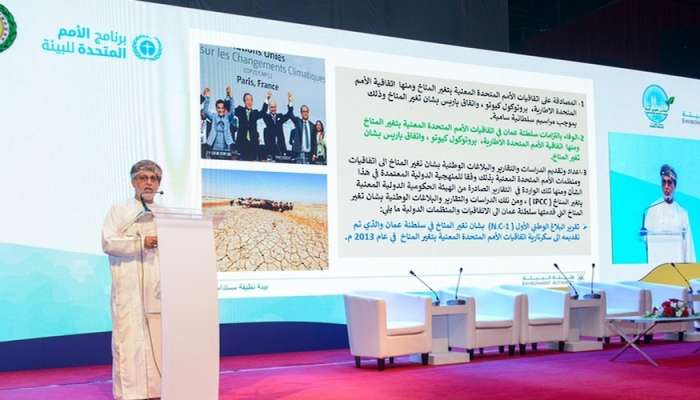
Muscat: The Sultanate of Oman on Tuesday hosted the 2nd edition of the Arab Environment Forum.
Themed “Together to Confront Climate Challenges to Achieve Water and Food security,” the forum discusses climate change and its impact on food security and water resources, and how to address the triple planetary crisis and enhance water and food security.
Dr. Abdullah Ali Al Amri, Chairman of the Environment Authority, said in his speech that the Sultanate of Oman, with the royal blessing of His Majesty Sultan Haitham bin Tarik, announced zero carbon neutrality for the Sultanate of Oman by the year 2050 and the adoption of the national strategy for an orderly transition to zero carbon neutrality in the Sultanate of Oman by 2050.
He stressed that the Sultanate of Oman has attached great attention to protecting the environment and preserving its natural resources as one of the basic pillars of comprehensive Omani development in its various stages and one of the pillars of Oman Vision 2040.
Al Amri highlighted the Sultanate of Oman’s interest in ensuring environmental safety, combating pollution and preserving ecosystems within the framework of Sustainable Development Goals (SDGs) by issuing many policies, strategies, laws and regulations in various environmental fields.
Dr. Mahmoud Fathallah, Director of the Department of Environmental Affairs and Meteorology at the Arab League, said in his speech that the second version of the forum focuses on efforts that contribute to addressing one of the environmental problems that the Arab region suffers from, and the problem of climate change and its effects on water and food security as one of the major challenges faced by Arab countries.
In the same context, Sami Demasi, UNEP Regional Director and Representative of the UNEP Programme in West Asia, explained that the forum comes at a time when the Arab region is facing environmental, economic and social crises together.
He stressed the necessity of solidarity and synergy between international, community and academic organisations to confront environmental challenges related to climate crises, ecosystems and cross-border pollution.
The forum, which was opened under the patronage of HH Sayyid Dr. Fahd Al Julanda Al Said, Vice Chancellor of Sultan Qaboos University (SQU), was organised by the Environment Authority, in cooperation with regional and international organisations.
It includes 5 working sessions on the relationship of drought and desertification to food and water systems, investment in innovation and strategic foresight in the Arab world towards a sustainable global environmental agenda and the shift towards resource sustainability: challenges and opportunities for confronting climate change to ensure water and food security.
The forum aims to provide a platform for dialogue among all partners, policy makers and international and regional experts in the fields of environment, climate change and green economy.
It also provides a platform for exchanging information and experiences in relevant environmental fields, identifies possible cooperation partnerships between different parties, and establishes a regional dialogue to discuss the current situation and prospects for future environmental efforts in the Arab region.
The forum also seeks to exchange knowledge and best practices before the Conference of the Parties to the United Nations Framework Convention on Climate Change (COP28), which will be held in the United Arab Emirates (UAE), and the sixth session of the United Nations Environment Assembly (UNEA-6), which will be held in Nairobi next February 2024.
It focuses on effective, comprehensive and sustainable multilateral actions to address climate change, biodiversity loss and pollution. -ONA